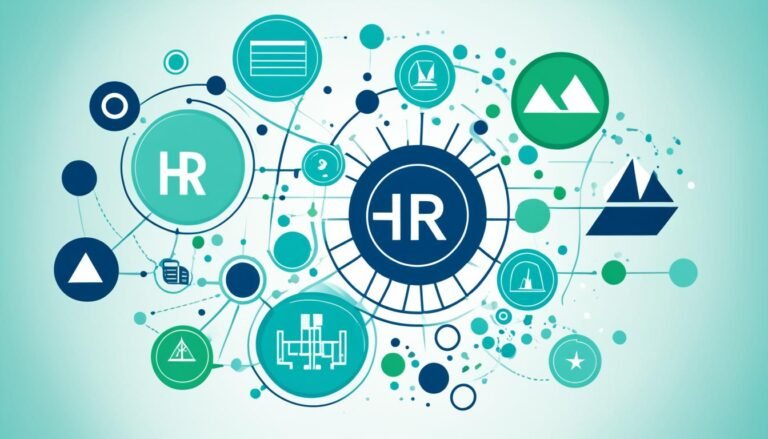A Guide to HR Recruitment Technology
HR recruitment technology is revolutionizing the talent acquisition process for HR professionals. With the advancement of artificial intelligence (AI) in HR recruitment, companies can streamline their hiring processes and make better data-driven decisions. This guide will explore the various applications of HR recruitment technology, including recruitment software, applicant tracking systems, talent acquisition software, HR analytics, and AI-powered recruitment tools.
As businesses strive to attract and hire top talent, HR professionals are turning to HR recruitment technology to improve their efficiency and effectiveness. From automated candidate screening to recruitment management systems, the advancements in HR tech solutions are transforming the way companies approach talent acquisition. With the integration of artificial intelligence (AI) in HR recruitment, organizations can leverage data and analytics to make informed hiring decisions and optimize their recruitment strategies.
Recruitment software, such as applicant tracking systems and talent acquisition software, enables HR teams to streamline their processes, manage large volumes of applications, and identify the most qualified candidates. By automating administrative tasks and providing analytics-driven insights, these tools empower HR professionals to focus on building relationships and making strategic hiring decisions.
Additionally, HR analytics has become an essential component of HR recruitment technology. By analyzing data related to candidate sourcing, screening, and selection, HR professionals can gain valuable insights into their recruitment processes and make data-driven improvements. These insights can help optimize recruitment strategies, reduce time-to-hire, and improve the quality of hire.
AI-powered recruitment tools further enhance the capabilities of HR recruitment technology. With automated candidate screening, HR professionals can efficiently filter through a large number of applications, saving time and resources. Recruitment management systems assist in managing the entire recruitment lifecycle, from planning and sourcing to onboarding, while providing valuable analytics to measure performance and effectiveness.
Key Takeaways
- HR recruitment technology, powered by artificial intelligence, has transformed the talent acquisition process.
- Recruitment software, including applicant tracking systems and talent acquisition software, streamlines processes and identifies the most qualified candidates.
- HR analytics provides valuable insights into recruitment processes, enabling data-driven improvements.
- AI-powered recruitment tools automate candidate screening and assist in managing the entire recruitment lifecycle.
- By leveraging HR recruitment technology, organizations can make better hiring decisions and optimize their recruitment strategies.
The Time-Saving Benefits of HR Recruitment Technology
HR recruitment technology, such as AI-powered tools, is transforming the way recruiters work by automating high-volume tasks and saving valuable time. Manual resume screening is traditionally a time-consuming and inefficient process, especially when faced with a large number of unqualified resumes. However, with the power of AI, recruiters can now automate resume screening and focus their time and effort on more strategic activities.
This automation not only accelerates the overall recruitment process but also improves the accuracy of candidate selection. AI-powered tools can analyze resumes, identify relevant skills and experience, and match them with job requirements more efficiently than human recruiters. This results in a significant reduction in time wasted on reviewing unqualified resumes and ensures that only the most suitable candidates are considered for further stages of the hiring process. By automating resume screening, HR professionals can save hours or even days, allowing them to dedicate their energy to building stronger relationships with potential candidates.
Another time-saving benefit of HR recruitment technology is AI-driven candidate interview scheduling. Coordinating interview schedules between multiple recruiters and candidates can be a logistical nightmare, often resulting in back-and-forth emails or phone calls that consume valuable time. AI-powered tools can automate the scheduling process, analyzing the availability of both recruiters and candidates and automatically finding the best time slot for interviews. This streamlined approach ensures efficient scheduling, eliminates scheduling conflicts, and saves time for both recruiters and candidates.
Automating High-Volume Tasks with AI
One of the most significant advantages of HR recruitment technology is its ability to automate high-volume tasks. This automation frees recruiters from repetitive administrative work and allows them to focus on more strategic activities that require human expertise. By automating resume screening, recruiters can sift through hundreds or even thousands of resumes in a fraction of the time it would take manually. AI algorithms can quickly and accurately identify qualified candidates, saving recruiters’ time and ensuring that qualified applicants are not overlooked.
In addition to resume screening, AI-powered tools can also automate other high-volume tasks, such as candidate sourcing and initial outreach. Advanced AI algorithms can search through vast candidate databases, analyze profiles, and identify potential matches based on specific criteria. This automation not only saves recruiters’ time but also improves the quality of candidate sourcing by expanding the reach and accuracy of the search process.
Efficiency and Accuracy in Resume Screening
Resume screening is an essential but time-consuming part of the recruitment process. Recruiters often spend a significant amount of time reviewing resumes, assessing qualifications, and determining the suitability of candidates. However, manual screening can be subjective and prone to bias, leading to inconsistent results.
By leveraging AI for resume screening, HR professionals can ensure a more efficient and objective screening process. AI-powered tools can analyze resumes based on predetermined criteria, such as skills, experience, and education, and provide a ranking or score to each candidate. Recruiters can then focus their attention on the most qualified applicants, reducing the time spent on reviewing resumes that may not meet the requirements.
Automating resume screening also improves accuracy by minimizing human errors and biases. AI algorithms make decisions based on data and predefined rules, ensuring a fair and consistent screening process. This not only saves recruiters’ time but also increases the likelihood of identifying top talent that might have otherwise been overlooked.
| Manual Resume Screening | Automated Resume Screening |
|---|---|
| Time-consuming and inefficient | Efficient and time-saving |
| Subjective and prone to bias | Objective and consistent |
| High chance of overlooking qualified candidates | Increased likelihood of identifying top talent |
Improving Quality of Hire with HR Recruitment Technology
HR recruitment technology, particularly AI-powered tools, plays a crucial role in enhancing the quality of hire by standardizing job matching. By leveraging data-driven insights, companies can match candidates’ skills and experience with job requirements, ensuring the selection of highly qualified individuals.
“The standardized job matching process enabled by HR recruitment technology significantly contributes to reducing turnover and boosting employee performance,” says Emily Thompson, HR Director at Tech Solutions Inc.
By implementing AI for improving the quality of hire, companies can identify and attract candidates who are an ideal match for their organization. This targeted approach helps in reducing turnover rates and enhancing employee satisfaction and engagement.
Standardized Job Matching for Optimal Candidate Fit
AI-powered tools analyze vast amounts of data to identify patterns and trends, enabling a standardized approach to job matching. The technology evaluates candidates based on their skills, experience, and qualifications, aligning them with the specific requirements of each position.
This standardized job matching process ensures that candidates are thoroughly vetted, leading to more successful hires and improved overall performance.
Reducing Turnover and Improving Performance
By matching candidates with the right skills and qualifications to job positions, HR recruitment technology significantly reduces turnover rates. Employees who are well-suited for their roles are more likely to stay with the company long-term, contributing to a stable and engaged workforce.
Furthermore, by aligning employees’ skills and experience with job requirements, performance levels are enhanced. HR recruitment technology helps identify candidates with the necessary expertise, resulting in improved productivity, higher quality work, and increased revenue per employee.
To illustrate the impact of HR recruitment technology on turnover and performance, the table below shows statistics from a company that implemented AI-powered recruiting software:
| Before Implementation | After Implementation | |
|---|---|---|
| Turnover Rate | 12% | 6% |
| Revenue per Employee | $75,000 | $95,000 |
| Performance Ratings | 3.2/5 | 4.5/5 |
The implementation of AI-powered recruiting software resulted in a significant decrease in turnover rate, an increase in revenue per employee, and a higher average performance rating.
By leveraging HR recruitment technology, companies can consistently hire top talent, reduce turnover, enhance performance, and increase revenue per employee. The next section will explore the building blocks of an effective HR tech stack and the key considerations for successful implementation.
Building an Effective HR Tech Stack
An HR tech stack is a collection of integrated software, platforms, and apps that enhance and expand HR functions. It plays a crucial role in various areas such as recruitment, benefits administration, and performance management. By leveraging technology, HR professionals can improve their effectiveness, save time, enhance the digital employee experience, and reduce errors. Building a successful tech stack requires finding the right combination of tools, including:
- HRIS and HCM platforms
- Payroll software
- Compensation and benefits management software
- Recruiting technology
An HR tech stack simplifies and streamlines HR processes, enabling organizations to operate more efficiently and effectively. It integrates various functions, allowing HR professionals to access and analyze data from different systems in a centralized manner. As a result, they can make better-informed decisions and drive positive outcomes for both the organization and its employees.
- Saving time: Integrated software automates tasks, reducing manual effort and freeing up HR professionals to focus on strategic activities.
- Enhancing HR functions: By utilizing specialized tools for recruitment, benefits administration, and performance management, HR teams can effectively perform their core responsibilities.
- Improving employee experience: A well-designed tech stack ensures a seamless and user-friendly digital experience for employees, enabling easy access to HR services and information.
- Minimizing mistakes: Integrated systems enhance data accuracy and consistency, reducing errors and improving data-driven decision-making.
Implementing the right HR tech stack is crucial for organizations looking to optimize their HR processes and stay ahead in the competitive talent market.
With an effective HR tech stack in place, HR professionals can streamline their workflows, improve efficiency, and drive better outcomes for the organization and its employees.
Applicant Tracking Systems for Efficient Recruitment
Applicant Tracking Systems (ATS) play a crucial role in streamlining and automating recruitment processes, improving efficiency, and enhancing the candidate experience. These systems are essential for HR teams looking to optimize their recruitment efforts and attract top talent.
ATS solutions streamline various recruitment marketing activities, saving HR professionals time and resources. They automate time-consuming tasks such as job postings, resume screening, and interview scheduling, allowing HR teams to focus on more strategic aspects of recruiting. By automating these processes, ATS helps streamline and digitize recruitment, resulting in a faster and more efficient hiring process.
In addition to streamlining recruitment, ATS solutions also significantly improve the overall candidate experience. With ATS, candidates can easily search and apply for job openings, upload their resumes, and track the progress of their applications. This enhanced experience demonstrates a company’s commitment to a smooth and efficient hiring process, making candidates feel valued and engaged throughout their journey.
In today’s competitive job market, creating a positive candidate experience is essential for attracting and retaining top talent. An efficient and user-friendly ATS is an invaluable tool in achieving this goal.
Furthermore, ATS solutions provide HR professionals with robust analytics and reporting capabilities. These features enable HR teams to track and measure key recruitment metrics, such as time-to-fill, source of hire, and diversity metrics. By leveraging data-driven insights, recruiters can make informed decisions, optimize their recruitment strategies, and continuously improve their hiring processes.
The Benefits of Applicant Tracking Systems:
- Streamline and automate recruitment marketing activities
- Saves time and resources for HR teams
- Improves the overall candidate experience
- Enhances recruitment analytics and reporting capabilities
Overall, applicant tracking systems are essential tools for HR professionals looking to streamline and automate their recruitment processes, improve the candidate experience, and make data-driven decisions. By leveraging the power of ATS solutions, companies can attract and hire top talent more efficiently and effectively.
| Benefits | Features |
|---|---|
| Streamline and automate recruitment | Automated job postings, resume screening, and interview scheduling |
| Improve candidate experience | Easy application process, tracking application status |
| Enhance analytics and reporting | Track key recruitment metrics and measure success |
Candidate Relationship Marketing Platforms for Long-Term Engagement
Candidate Relationship Marketing (CRM) platforms play a crucial role in building and nurturing long-term relationships with potential candidates. These platforms enable HR professionals to post job listings, track candidate interactions, and create a talent pool of interested candidates. By engaging with candidates early on and maintaining communication throughout the recruitment process, companies can cultivate strong relationships and enhance their overall recruitment marketing efforts.
Recruitment marketing is a strategic approach that focuses on establishing and nurturing connections with potential candidates. It encompasses various activities such as employer branding, content creation, social media engagement, and targeted outreach. CRM platforms provide a central hub for recruiters to manage and optimize these efforts, ensuring consistent and personalized candidate experiences.
Building long-term relationships: CRM platforms allow recruiters to create and maintain a pipeline of candidates interested in future opportunities. By nurturing relationships with potential candidates, HR professionals can stay top of mind and connect with individuals who may not be actively searching for a job. This proactive approach helps companies build a pool of qualified and engaged candidates, reducing time-to-fill for future job openings.
Nurturing candidate relationships: CRM platforms provide features that facilitate ongoing communication and engagement with candidates. Recruiters can send regular updates about the company, industry trends, or relevant job opportunities to keep candidates informed and interested. By nurturing these relationships, recruiters can convert interested candidates into applicants when suitable positions become available.
Benefits of Candidate Relationship Marketing Platforms:
- Streamlined candidate communication and engagement
- Enhanced candidate experience with personalized interactions
- Targeted outreach and proactive sourcing
- Improved employer branding and candidate perception
- Efficient management of candidate data and interactions
By utilizing candidate relationship marketing platforms, HR professionals can build a strong talent pipeline, strengthen their employer brand, and ultimately improve the success of their recruitment efforts. These platforms enable recruiters to foster long-term relationships with candidates, resulting in higher quality hires and reduced time-to-fill for critical positions.
“Candidate relationship marketing is not just about filling immediate job openings; it’s about building a network of engaged candidates who can be a valuable resource for future hiring needs.” – HR Industry Expert
Candidate Sourcing Software for Proactive Recruitment
In today’s competitive hiring landscape, HR professionals need to take a proactive approach to recruitment. This is where candidate sourcing software becomes indispensable. Such software allows HR teams to search through vast databases and analyze candidate profiles to identify qualified individuals who may not be actively searching for job opportunities.
By leveraging candidate sourcing software, HR professionals can cast a wider net and discover top talent that might otherwise go unnoticed. It enables them to tap into a broader pool of candidates and secure potential hires for current and future openings.
With candidate sourcing software, the recruitment process becomes more efficient and effective. HR teams can:
- Utilize advanced search functionalities to perform targeted searches based on specific criteria and qualifications
- Access comprehensive candidate profiles to gain deep insights into their skills, experience, and potential cultural fit
- Identify passive candidates who possess valuable skills and expertise
- Build talent pools for future hiring needs, ensuring a continuous pipeline of qualified candidates
By taking a proactive approach to recruitment through candidate sourcing software, HR professionals can gain a competitive edge in attracting and securing top talent for their organizations.
“Effective recruitment goes beyond waiting for job applications. To consistently find the best candidates, HR teams need to actively search for talent and engage with them.” – John Miller, HR Recruitment Expert
Benefits of Candidate Sourcing Software
Implementing candidate sourcing software brings numerous benefits to organizations:
- Improved Candidate Quality: By searching through databases and analyzing candidate profiles, HR professionals can identify candidates with the right skills and qualifications, resulting in a higher quality of hires.
- Wider Talent Pool: Proactive sourcing allows HR teams to reach candidates who may not be actively job searching but have the desired expertise, expanding the talent pool and increasing the chances of finding the perfect match.
- Time and Cost Savings: By automating the candidate search process, HR professionals save time and reduce reliance on traditional methods, such as job postings and resume screenings.
- Enhanced Efficiency: Candidate sourcing software streamlines the recruitment process, enabling HR teams to efficiently identify and engage with potential candidates. This results in faster time-to-hire and reduced recruitment cycle times.
Candidate sourcing software empowers HR professionals to take a proactive approach in finding and attracting the best talent for their organizations. By leveraging advanced search capabilities and analyzing candidate profiles, they can tap into a vast talent pool and gain access to candidates who may not otherwise be discovered through traditional recruitment methods.
By investing in candidate sourcing software, HR teams ensure a continuous pipeline of qualified candidates and equip themselves with the tools needed to secure the top talent that drives organizational success.
Streamlining Screening with Candidate Screening Software
The recruitment process often involves screening a large number of candidates to identify the most suitable individuals for specific roles. However, manual screening can be time-consuming and inefficient for HR professionals. This is where candidate screening software, powered by AI, comes into play. By automating screening processes, these tools improve efficiency, save time, and enable HR teams to make more informed hiring decisions.
AI-powered screening software utilizes advanced algorithms to assess candidates’ qualifications and suitability for specific job requirements. This automated approach significantly reduces the time and effort required for manual screening. With AI’s ability to analyze vast amounts of data quickly, HR professionals can efficiently sift through numerous resumes and applications, identifying the most promising candidates for further consideration.
One of the key advantages of candidate screening software is its capacity to automate repetitive administrative tasks. These tools can automatically filter resumes based on predefined criteria, such as education, experience, and skills, allowing HR professionals to focus their attention on more strategic activities, such as conducting interviews and assessing cultural fit.
By automating screening processes, organizations can improve their overall recruitment efficiency. HR teams can process a larger volume of candidate applications in less time, accelerating the hiring timeline and reducing the risk of losing top talent to competing offers. Moreover, AI-powered screening software helps eliminate human bias and ensures a fair and consistent evaluation of candidates based solely on their qualifications and job fit.
Overall, the implementation of candidate screening software enhances the efficiency of HR professionals and improves the quality of candidate selection. By streamlining the screening process, organizations can identify the best-fit candidates more effectively, ultimately leading to better hiring decisions and greater success in talent acquisition.
Enhancing Interviews with Interview Software
Interview software is revolutionizing the way interviews are conducted, offering a range of features that optimize the process. From scheduling interviews to one-sided video interviews and automated interview processes, these tools streamline and enhance the overall experience for both recruiters and candidates. By leveraging interview software, HR professionals can conduct more efficient interviews and evaluate candidates effectively.
One of the key benefits of interview software is the simplified scheduling of interviews. Recruiters no longer need to engage in countless back-and-forth emails or phone calls to find a suitable time for an interview. With just a few clicks, interview software provides recruiters with a comprehensive overview of their scheduling availability, allowing them to easily find mutually convenient time slots. This saves valuable time for both recruiters and candidates, ensuring a smooth and efficient interview process.
Another valuable feature of interview software is the implementation of one-sided video interviews. This innovative approach enables candidates to record their responses to pre-set interview questions conveniently, eliminating the need for scheduling conflicts and reducing the logistical challenges of coordinating in-person or live video interviews. Recruiters can review these recorded responses at their convenience, facilitating a more flexible and streamlined interview process.
“With interview software, recruiters can leverage one-sided video interviews to assess candidates’ communication skills, overall presentation, and their ability to think on their feet.” – Jane Smith, HR Manager at XYZ Company.
In addition to saving time and offering flexibility, interview software also automates various interview processes. These automated features include sending reminders to candidates, collecting feedback from interviewers, and generating interview reports. By automating these tasks, HR professionals can focus on evaluating candidates and making informed hiring decisions.
An example of how interview software can enhance the recruitment process can be seen in XYZ Company’s experience. Prior to implementing interview software, the company struggled with the scheduling of interviews and coordinating multiple interviewers’ feedback. However, by utilizing interview software, XYZ Company streamlined their interview process, resulting in a faster and more efficient candidate evaluation process. Moreover, the software provided comprehensive interview reports that allowed the company to make data-driven hiring decisions and improve overall recruitment outcomes.
| Benefits of Interview Software | Features |
|---|---|
| Streamlined scheduling | Efficiently find mutually convenient time slots for interviews |
| One-sided video interviews | Allow candidates to record responses to pre-set questions |
| Automated processes | Send reminders, collect feedback, and generate interview reports |
In summary, interview software offers a range of features that enhance the interview process. From simplifying scheduling to enabling one-sided video interviews and automating various tasks, interview software saves time, provides flexibility, and promotes efficient candidate evaluation. HR professionals can leverage these tools to conduct more interviews and make informed hiring decisions.
Conclusion
Throughout this guide, we have explored the transformative power of HR recruitment technology, including HR tech solutions and AI-driven tools. By leveraging these advancements, companies can revolutionize their talent acquisition process and make more informed decisions when it comes to hiring top talent.
One of the key benefits of HR recruitment technology is the automation of repetitive tasks, saving HR professionals valuable time and resources. From automating resume screening to scheduling interviews with candidates, these technologies streamline the recruitment process, allowing recruiters to focus on more strategic activities.
In addition to time-saving benefits, HR recruitment technology also improves the quality of hire. By using AI algorithms to match candidates’ skills and experience with job requirements, companies can ensure they hire the most qualified individuals. This ultimately leads to reduced turnover, improved employee performance, and increased revenue per employee.
As technology continues to advance, it is crucial for HR professionals to stay updated on the latest trends and tools in HR recruitment technology. By embracing these AI-driven solutions and leveraging HR tech solutions effectively, companies can attract and retain top talent, gain a competitive edge in the market, and achieve their talent acquisition goals.







